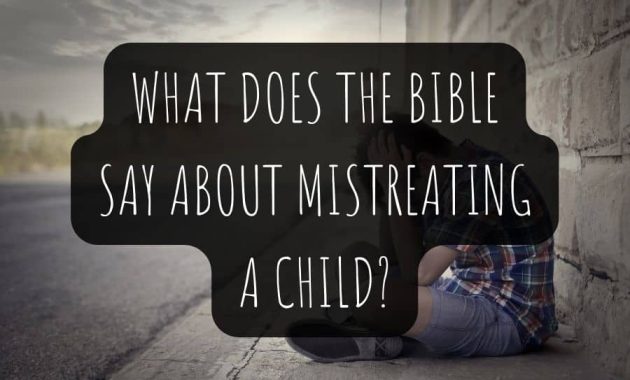What Does The Bible Say About Mistreating A Child?
As a society, we are responsible for protecting and caring for our children. Unfortunately, not all parents or caregivers fulfil this duty.
Child abuse and neglect have been prevalent throughout history, and the Bible contains several passages condemning the mistreatment of children.
In this article, we will explore what the Bible says about mistreating a child and the consequences of such actions.
See also: Bible Verses About Generations
Understanding Child Abuse
Before delving into what the Bible says about mistreating a child, it is important to understand what constitutes child abuse. According to the World Health Organization, child abuse refers to any action or inaction by another person that harms or threatens to harm a child’s well-being. This includes physical, emotional, and sexual abuse and neglect.
The Bible’s Stance on Mistreating a Child

The Bible has a clear stance on mistreating children. In Matthew 18:6, Jesus says, “But whoever causes one of these little ones who believe in me to sin, it would be better for him to have a great millstone fastened around his neck and to be drowned in the depth of the sea.”
This verse emphasizes the seriousness of mistreating children and the severe consequences that come with it.
Furthermore, the Bible instructs parents to raise their children with love and discipline. Proverbs 22:6 says, “Train up a child in the way he should go; even when he is old, he will not depart from it.”
This verse emphasizes the importance of parents taking an active role in their children’s upbringing, teaching them right from wrong and instilling values that will stay with them throughout their lives.
Consequences of Mistreating a Child
Mistreating a child can have severe consequences, both for the child and the perpetrator. In addition to the physical and emotional harm caused to the child, the perpetrator can face legal repercussions and long-term psychological effects.
The Bible also warns of the spiritual consequences of mistreating children. In Matthew 18:10, Jesus says, “See that you do not despise one of these little ones. For I tell you that in heaven their angels always see the face of my Father who is in heaven.”
Healing and Forgiveness
While mistreating a child is a serious offense, the Bible also emphasizes the power of healing and forgiveness. Through faith in God and repentance for their actions, perpetrators of child abuse can seek forgiveness and begin the journey toward healing.
Furthermore, the Bible encourages us to support and care for victims of child abuse. In James 5:14-15, it says, “Is anyone among you sick? Let him call for the elders of the church, and let them pray over him, anointing him with oil in the name of the Lord. And the prayer of faith will save the one who is sick, and the Lord will raise him up. And if he has committed sins, he will be forgiven.”
Overall, God places great importance on treating children with love, kindness, and respect. It is important to remember that children are gifts from God and should be treated in a godly way.
FAQs On What Does The Bible Say About Mistreating A Child?
What is child abuse?
Child abuse is any action or lack of action that causes harm or risk of injury to a child. It can take many forms, including physical abuse (such as hitting, shaking, or burning), sexual abuse (such as rape or molestation), emotional abuse (such as belittling or manipulating a child), neglect (such as failing to provide basic necessities like food, shelter, or medical care), and exposure to violence or substance abuse.
Child abuse can have severe and long-lasting effects on a child's physical, emotional, and psychological well-being and is considered a serious criminal offense in most countries.
Can perpetrators of child abuse seek forgiveness?
Through faith in God and repentance for their actions, perpetrators of child abuse can seek forgiveness and begin the journey towards healing.
How can we support victims of child abuse?
The Bible encourages us to support and care for victims of child abuse through prayer, seeking spiritual support and guidance, and providing practical assistance where possible.
What should I do if I suspect someone is mistreating a child?
If you suspect someone is mistreating a child, immediately report it to the appropriate authorities. This can include contacting child protective services or law enforcement to ensure the safety and well-being of the child.






